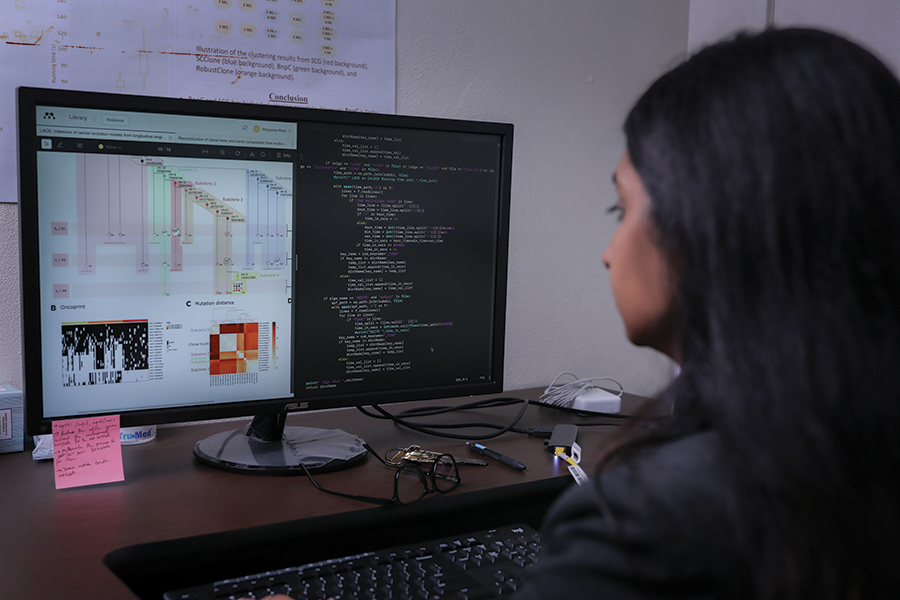Predicting Progression

To many people, the never-ending stream of letters, numbers, and symbols on Rituparna Khan’s computer monitor are nonsensical cyan, magenta, yellow, and white characters floating on a plain black background. To her, however, the screen represents years of hard work and a breakthrough in cancer research.
Khan’s area of expertise is bioinformatics, an interdisciplinary field developing methods and software tools to understand biological data, especially large and complex data sets.
The sixth-year doctoral student in the Florida State University Department of Computer Science is combining her passion for medicine with computer programming and coding to better treat early-stage cancer. The software Khan developed characterizes and predicts cellular mutations that lead to cancer, and it is two-and-a-half times more accurate than the only other similar tool in existence.
“My software tool, ScLongTree, shows promise for the improved care of early-stage cancer patients because when it is successfully implemented, medical professionals can use it to predict how a particular patient’s cancer will likely progress,” Khan said. “Accurately predicting the cancer’s progression leads to better-informed treatment plans.”
Cancers spread by acquiring new mutations at different stages of advancement. Knowing the specific moment in time when a mutation is set to happen is critical for determining accurate diagnoses, delivering realistic prognoses, and developing personalized treatment plans that can minimize side effects and improve patient outcomes.
Single-cell DNA sequencing makes it possible to determine genetic differences within a single tumor and provides a clearer understanding of how a particular patient’s cancer has developed. As the cost of single-cell DNA sequencing has decreased in recent years, it has become possible to check in on patients every few years, which has generated data allowing researchers to sample across longer timelines. Based on a particular patient’s collected data from their existing mutated cells, Khan’s tool can predict their future data, or their cancer’s progression.
“The beauty of computer science is that it has such a wide variety of applications,” said Khan, who had originally planned to go to medical school before pivoting to her current area of research. “Coding and programming have the ability to solve incredibly difficult and complex issues in nearly any field.”

The only other tool like Khan’s is the Longitudinal Analysis of Cancer Evolution, better known as LACE, which was first published in the Journal of Computational Science in 2022. Compared to ScLongTree, LACE is limited in terms of scalability, meaning it cannot compute more than four timepoints. ScLongTree is also more accurate — in a triple negative breast cancer dataset with three sequencing time points, ScLongtree was able to recover the evolutionary history of the cancer and detect a novel mutation at the second sequencing time point, which was not flagged by LACE. In this particular scenario, ScLongTree’s insights could help doctors determine if the patient needs a mastectomy or only chemotherapy and radiation.
Prior to coming to FSU in 2018, Khan earned an undergraduate degree in computer science at the Future Institute of Engineering and Management in Kolkata, India, and worked as a senior project engineer for Wipro, an IT consulting company headquartered in Bengaluru.
“I decided to pursue my doctorate after nearly four years at Wipro because I wanted to dive even deeper into the field,” Khan said. “Now, applying my computer science skills in cancer research feels like a full-circle moment with my dream of working in medicine coming true.”
After more than a year and two revisions, Khan’s paper on her tool is awaiting approval for presentation at the Research in Computational Molecular Biology’s 2024 conference in Boston, Massachusetts. Having her research published is the next step towards reaching her primary goal: Wide implementation of and access to her software tool.
“Ritu has an incredible talent for presenting her research, and this skill will take her far whether she goes into academia or industry,” said Xian Mallory, assistant professor of computer science and Khan’s doctoral major professor. “She is also easy-going and selfless, and she is currently mentoring an undergraduate student in my stead.”
Upon her anticipated graduation this fall, Khan aspires to enter industry and sees herself working for pharmaceutical companies or national laboratories.
“Having the opportunity to advance cancer research through my work is a blessing,” Khan said. “While cancer research is absolutely challenging, I enjoy working through the challenge, and knowing that my research can help so many people in the future drives me to do my best. I am happy that my research is helping the computer science community solve larger issues.”
